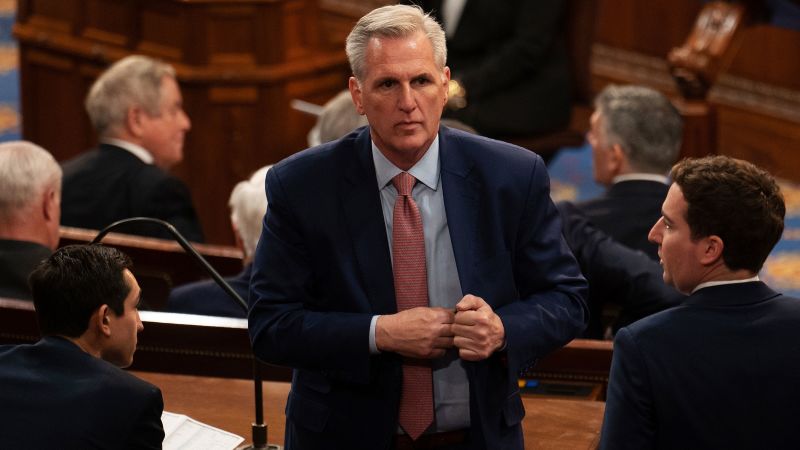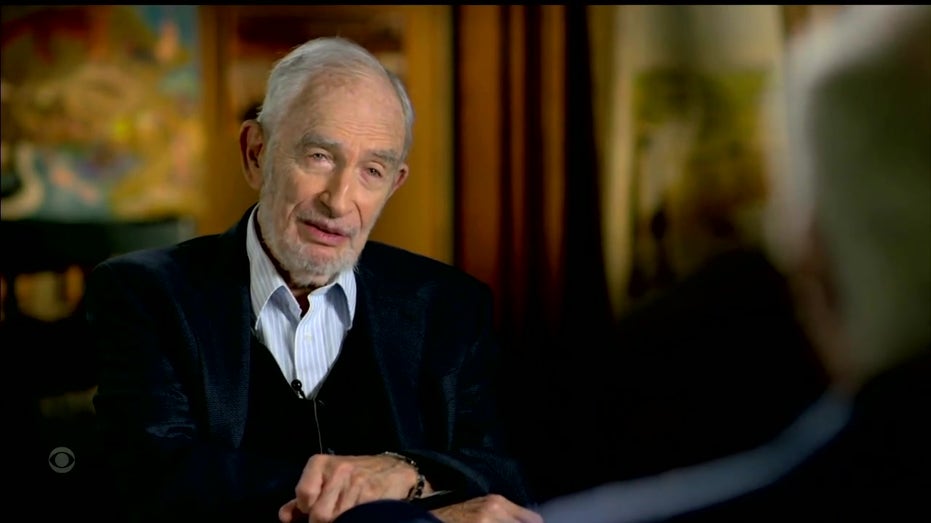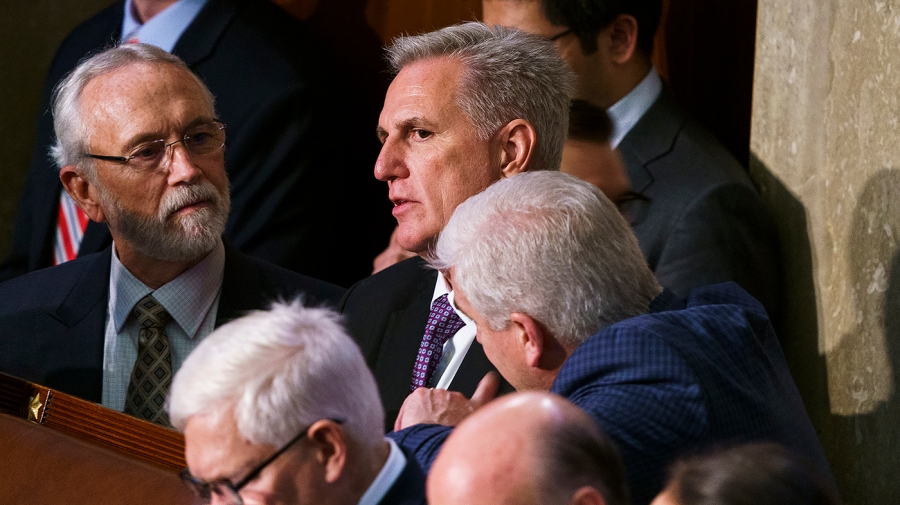CNN
—
Kevin McCarthy suffered yet another stinging defeat on Wednesday as he lost in the sixth round of voting to elect a speaker – a major blow that increasingly imperils his bid and heightens uncertainty over whether he can still secure the gavel or if a viable candidate will emerge as an alternative.
The House of Representatives has adjourned until 8 p.m. ET on Wednesday after failing to elect a new speaker. Now, Republicans are scrambling to find a resolution and talks are expected to continue.
Republicans are considering appointing four members each from the pro-McCarthy and anti-McCarthy camps to negotiate a path forward on choosing a House speaker, one GOP source tells CNN.
The House GOP majority has been stuck at a contentious stalemate amid opposition to McCarthy from a group of conservatives. The fight, which began on the first day of the 118th Congress, has thrown the new House GOP majority into chaos and undercut the party’s agenda.
The House will continue to be paralyzed until this standoff is resolved. The situation has grown dire for McCarthy’s political future as Republican allies are beginning to fear that the House GOP leader may not be able to pull off his gamble for speaker if the fight goes much longer. While McCarthy has firm support among most of the conference, some are not committed to sticking with him.
It’s not at all clear whether McCarthy and his allies will be able to lock down the votes – and the longer the fight drags on the more imperiled his speaker bid has become.
But there are some signs that negotiations may be progressing. Rep. Dan Bishop of North Carolina, one of the 20 members who has opposed McCarthy in the votes, told CNN things have changed and there is a “dynamic kind of atmosphere” now.
“I’m encouraged by it,” he said.
Rep. Chip Roy of Texas, another member who has voted against McCarthy, told CNN he has had “more productive” talks over the last two hours with McCarthy allies than he has had over the last few weeks. He said he expects to be part of talks that will take place tonight.
But in a sign of McCarthy’s remaining challenges: Rep. Andy Biggs of Arizona, a prominent member of the opposition group, told CNN he is still a hard no.
House Republicans hold 222 seats in the new Congress, so for McCarthy to reach 218, he can only afford to lose four GOP votes. His obstacle is that he faces a small but determined contingent of hardline conservatives who have so far been successful in denying him the votes to secure the gavel.
The group has used the leverage they have in the razor-thin Republican majority to extract concessions. McCarthy has already given in to a number of their demands, including making it easier to topple the sitting speaker, but so far his efforts have not been enough, and
The House convened on Wednesday to continue voting after three rounds of votes on Tuesday. McCarthy has come up short each time, failing to hit the majority threshold needed to secure the speakership.
As the votes stretched on Tuesday, the situation appeared to become even more dire for McCarthy, as the vote count in opposition to his speaker bid grew.
The tally for the first ballot in the speaker vote was 203 for McCarthy, with 19 Republicans voting for other candidates. The tally for the second ballot was 203 votes for McCarthy with 19 votes for GOP Rep. Jim Jordan of Ohio. In the third round of voting, there were 202 votes for McCarthy and 20 votes for Jordan, with Rep. Byron Donalds joining the 19 GOP lawmakers who had voted against McCarthy in the first two rounds.
It was the first time an election for speaker went to multiple ballots since 1923.
“My vote yesterday was basically to break a deadlock, because we were deadlocked, and we were not getting anywhere,” Donalds, a Florida Republican, said Wednesday on “CNN This Morning.” “Right now, (McCarthy) doesn’t have a pathway to get there. If that reemerges, yeah, I can be there, that’s fine, but what’s necessary now is that Republicans come together and find a way to elect a speaker.”
In the fourth round of voting, 20 Republicans voting together for Donalds as the group switched their collective support from Jordan to Donalds. Rep. Victoria Spartz of Indiana voted present, lowering McCarthy’s threshold to 217.
Spartz told CNN she did so because she wanted to allow for more negotiations within the conference to address the concerns of the 20 members.
The final tally for the fifth vote was again 201 votes for McCarthy, 20 for Donalds and one present vote.
The final tally for the sixth vote was the same: 201 for McCarthy, 20 for Donalds and one present vote.
Trump is watching closely as the dynamic plays out on Capitol Hill and his public support has been a key focus of McCarthy’s efforts.
Two GOP sources familiar with the matter said McCarthy’s allies were panicking on Tuesday after the former president gave a tepid response to NBC News when asked about his support for McCarthy. The former president also declined to issue a statement Monday reiterating his endorsement of McCarthy despite a behind-the-scenes effort from several McCarthy allies to get Trump to do so, two sources said.
One close McCarthy ally then began working behind the scenes to do clean-up duty and started pressing for Trump to put out a statement clarifying his support. McCarthy and Trump then connected by phone, where McCarthy said Trump expressed he was still committed to backing him. Trump put out a strong endorsement on Truth Social Wednesday morning, imploring Republicans not to “TURN A GREAT TRIUMPH INTO A GIANT & EMBARRASSING DEFEAT” and urging them to vote for McCarthy.
Although Trump’s statement might not move the needle among the fiercest McCarthy foes, one of the sources said McCarthy world was worried about looking “weak” and like he was bleeding support, so they felt it was important to reverse the narrative.
Gaetz, one of the House Republicans opposing McCarthy’s bid for speaker, dismissed Trump’s latest effort to help the California Republican as “sad.”
“This changes neither my view of McCarthy nor Trump nor my vote,” Gaetz said in a statement to Fox News Digital on Wednesday, shortly after Trump came to McCarthy’s defense in the Truth Social post.
Long a staunch Trump ally, Gaetz’s refusal to bow to Trump’s desire for a McCarthy speakership raises new questions about the former president’s dwindling influence over Republicans in the midst of his third presidential campaign.
“If Matt Gaetz is ignoring you, that’s not a good sign,” said one Trump ally who is involved with his 2024 campaign.
Trump has been making calls on McCarthy’s behalf over the last 24 hours in an attempt to break the conservative blockade against him, this person said, but his efforts have so far been fruitless.
One lawmaker who spoke with Trump late Tuesday suggested the former president should run for speaker himself, according to a person briefed on the call. Trump demurred and continued to push this person to support McCarthy, claiming that he would be a solid “America First” supporter.
This story and headline have been updated with additional developments.










